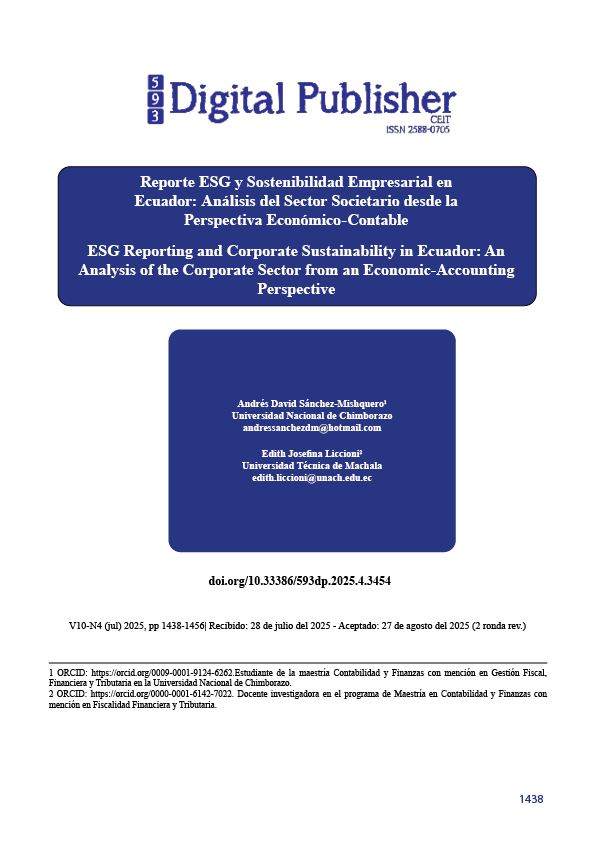ESG Reporting and Corporate Sustainability in Ecuador: An Analysis of the Corporate Sector from an Economic-Accounting Perspective
Main Article Content
Abstract
This research interprets the actual level of commitment of the Ecuadorian corporate sector to ESG sustainability and its influence on economic value creation, measured through the Free Cash Flow to the Firm (FCFF) in 2024. A mixed-methods approach was employed, combining quantitative econometric analysis with qualitative documentary and bibliographic review. The study of 4,000 Ecuadorian companies empirically demonstrated that corporate sustainability generates tangible economic value, revealing a positive correlation between ESG commitment and financial profitability. Companies with low ESG commitment could increase their FCFF by approximately $1,543,779 when shifting to an intermediate commitment level, and by $1,666,790 when achieving a high commitment level—confirming that sustainability is not only an ethical imperative but also a profitable financial strategy. However, the analysis identified a bias toward environmental sustainability, accompanied by weak social and governance institutionalization. This reflects a partial implementation of the ESG approach in the Ecuadorian context, where challenges persist, such as noncompliance with legal reporting obligations, poorly designed incentives that promote greenwashing, and institutional weaknesses that hinder corporate transparency. The findings suggest that strengthening sustainability disclosure could lead to significant economic transformations, redefine competitive market dynamics, and restore public trust in fragile institutional environments—demonstrating that sustainability represents a strategic opportunity to create shared value between financial profitability and social responsibility.
Downloads
Article Details

This work is licensed under a Creative Commons Attribution-NonCommercial-ShareAlike 4.0 International License.
1. Derechos de autor
Las obras que se publican en 593 Digital Publisher CEIT están sujetas a los siguientes términos:
1.1. 593 Digital Publisher CEIT, conserva los derechos patrimoniales (copyright) de las obras publicadas, favorece y permite la reutilización de las mismas bajo la licencia Licencia Creative Commons 4.0 de Reconocimiento-NoComercial-CompartirIgual 4.0, por lo cual se pueden copiar, usar, difundir, transmitir y exponer públicamente, siempre que:
1.1.a. Se cite la autoría y fuente original de su publicación (revista, editorial, URL).
1.1.b. No se usen para fines comerciales u onerosos.
1.1.c. Se mencione la existencia y especificaciones de esta licencia de uso.
References
Acosta, A. (2019). Breve Historia Económica del Ecuador.
Akerlof, G., & Shiller, R. (2015). Phishing for phools: The economics of manipulation and deception. Princeton University Press.
Bustillo, I., Perrotti, D. E., & Velloso, H. (2018). gs in Latin America and the Caribbean (Estudios y perspectivas – Oficina de Washington, D.C., No. 18). CEPAL. Obtenido de https://bit.ly/3wR8EML
Correa, D., Reyes, D., & Montoya, K. (2018). La información no financiera y el desempeño financiero empresarial. Semestre Económico, 21(46), 185–202.
Ehlrich, P., & Holdren, J. (1971). Impact of Population Growth. Science, 1212-1219.
Endrizzi, D. (2020). La moratoria de la deuda externa en Ecuador: ¿Ideologia vs. Ideologia? Cultura Latinoamericana, 31(1), 232-265.
Garcia, M. A., Liu, R., Nihart, A., El Hayek, E., Castillo, E., Barrozo, E. R., & Campen, M. J. (2024). Quantitation and identification of microplastics accumulation in human placental specimens using pyrolysis gas chromatography mass spectrometry. Toxicological Sciences, 1(199), 81-88.
Gates, B. (2021). Cómo evitar un desastre climático: Las soluciones que ya tenemos y los avances que aún necesitamos. Colombia: Nomos S.A.
Georgescu-Roegen, N. (1971). La ley de la entropía y el proceso económico. Madrid: Fundación Argentaria-Visor Distribuidores.
Greco, A. (2024). The Integrity Pact: Harnessing collective action for good governance and business integrity in public procurement. Transparency Internationa.
GRI . (2024). Estándares GRI Consolidados. GRI.
Grossman, G. M., & Krueger, A. B. (1991). Environmental impacts of a North American free trade agreement. National Bureau of Economic Research Working Paper Series(3914).
Gujarati, D., & Porter, D. (2008). Basic Econometrics (Quinta edición). McGraw-Hill Education.
IDMC. (2023). Global Report on Internal Displacement 2023. Obtenido de https://www.internal-displacement.org/global-report/grid2023/
IFRS Foundation. (2023). IFRS S1 and S2: General Sustainability-related Disclosures and Climate-related Disclosures. London: IFRS.
Kjellstrom, T., Maître, N., Saget, C., Otto, M., & Karimova, T. (2019). Trabajar en un planeta más caliente: El impacto del estrés térmico en la productividad laboral y el trabajo decente. OIT. doi:978-92-2-031465-4
Krugman, P. R., & Obstfeld, M. (2018). Economía internacional: Teoría y política (10.ª ed.). Pearson Educación.
Lewis, W. A. (1954). Economic development with unlimited supplies of labour. The Manchester School, 22(2), 139–191.
Liccioni, E., Cejas, M., Hernandez, S., Murillo, M., & Venegas, G. (2023). Enfoque Cuantitativo y Cualitativo: Una mirada de los métodos mixtos. Fundación Editorial Univrsidad Ezequiel Zamora.
Luccioni, A., Strubell, E., & Crawford, K. (2025). From Efficiency Gains to Rebound Effects: The Problem of Jevons’ Paradox in AI’s Polarized Environmental Debate. arXiv preprint(16548). doi:https://doi.org/10.48550/arXiv.2501.16548
Matei, M., Răbonțu, C. I., & Băleanu, G. (2023). Matei, M., Răbonțu, C. I., & Băleanu, G. (2023). The importance of integrating ESG principles in the investment decision-making process. the European Proceedings of Social & Behavioural Sciences, 519–529.
Mazzucato, M., & Collington, R. (2024). El gran Engaño: Como la industria de la consultoría debilita empresas, infantiliza a los gobiernos y pervierte la economía. Taurus. Edición de Kindle.
Mazzucato, M., Collins, J., & Gouzoulis, G. (2023). Mapping modern economic rents: the good, the bad, and the grey areas. Cambridge Journal of Economics. doi:https://doi.org/10.1093/cje/bead013
Meadows, D. H., Meadows, D. L., Randers, J., & Behrens, W. W. (1972). The limits to growth: A report for the Club of Rome’s project on the predicament of mankind. Universe Books.
Moncayo, E. (2004). El debate sobre la convergencia económica internacional e interregional: enfoques teóricos y evidencia empírica. Eure , 30(90), 7-26.
Ocampo, J. A., Stallings, B., Bustillo, I., Velloso, E., & Frenkel, R. (2014). La crisis latinoamericana de la deuda desde la perspectiva histórica. Santiago de Chile: Comisión Económica para América Latina y el Caribe (CEPAL).
Pozo, M., & Acosta, A. (12 de 05 de 2025). Reaparece El Déficit. (M. Rivadeneira, Entrevistador) Democraciatv. Quito.
Ramírez, J. C., Orozco, C., & Peña, D. (2023). Medidas de riesgo coherentes con ESG para la inversión sostenible. Revista Facultad de Ciencias Económicas: Investigación y Reflexión, 28(2), 67–85.
Sachs, J. (2015). La era del Desarrollo Sostenible. Deusto.
Solow, R. M. (1956). A contribution to the theory of economic growth. The Quarterly Journal of Economics, 70(1), 65–94.
Stern, N. (2006). Stern Review: The Economics of Climate Change. Cambridge University Press & Assessment.
UNCTAD. (2023). Sustainability of external debt and development. United Nations Conference on Trade and Development.
WCED. (1987). Our Common Future. Oxford University Press.
Yang, W., & Adigue, E. (30 de marzo de 2023). GRI standards: Setting the pace for sustainability reporting. (B. S. Institute, Entrevistador) BSI Group. Obtenido de https://acortar.link/IRcS8O
Zhang, W. W. (2016). China Horizon, The: Glory And Dream Of A Civilizational State: GLORY & DREAM OF A CIVILIZATIONAL STATE . World Century.
Zuboff, S. (2019). The age of surveillance capitalism: The fight for a human future at the new frontier of power. Profile Books.
Zurita, C., Erazo, K., Solorzano, C., Álvaro, M., & Verdezoto, M. (2023). Los secretos de la deuda China. Fundación 1000 hojas.



